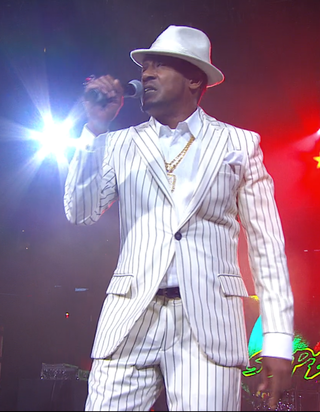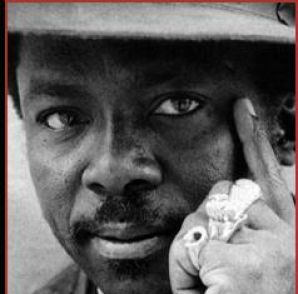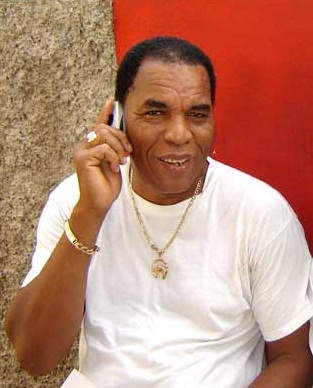Related Research Articles
Raggamuffin music is a subgenre of dancehall and reggae music. The instrumentals primarily consist of electronic music with heavy use of sampling.

Toasting or deejaying is the act of talking, usually in a monotone melody, over a rhythm or beat by a deejay. It can either be improvised or pre-written. Toasting developed in Jamaica, before it took up that name and being part of the sound system era, a similar sound of it is found in mento and now can be heard over musical styles including ska, reggae, dancehall, dub, grime, hip hop, soca and bouyon music. The combination of singing and toasting is known as singjaying.
In Jamaican dancehall music, a riddim is the instrumental accompaniment to a song and is synonymous with the rhythm section. Jamaican music genres that use the term consist of the riddim plus the voicing sung by the deejay. A given riddim, if popular, may be used in dozens—or even hundreds—of songs, not only in recordings but also in live performances.
The music of Jamaica includes Jamaican folk music and many popular genres, such as mento, ska, rocksteady, reggae, dub music, dancehall, reggae fusion and related styles.
Dancehall is a genre of Jamaican popular music that originated in the late 1970s. Initially, dancehall was a more sparse version of reggae than the roots style, which had dominated much of the 1970s. In the mid-1980s, digital instrumentation became more prevalent, changing the sound considerably, with digital dancehall becoming increasingly characterized by faster rhythms. Key elements of dancehall music include its extensive use of Jamaican Patois rather than Jamaican standard English and a focus on the track instrumentals.
Rocksteady is a music genre that originated in Jamaica around 1966. A successor of ska and a precursor to reggae, rocksteady was the dominant style of music in Jamaica for nearly two years, performed by many of the artists who helped establish reggae, including harmony groups such as the Techniques, the Paragons, the Heptones and the Gaylads; soulful singers such as Alton Ellis, Delroy Wilson, Bob Andy, Ken Boothe and Phyllis Dillon; musicians such as Jackie Mittoo, Lynn Taitt and Tommy McCook. The term rocksteady comes from a popular (slower) dance style mentioned in the Alton Ellis song "Rocksteady", that matched the new sound. Some rocksteady songs became hits outside Jamaica, as with ska, helping to secure the international base reggae music has today.

Ewart Beckford OD, known by the stage name U-Roy, was a Jamaican vocalist and pioneer of toasting. U-Roy was known for a melodic style of toasting applied with a highly developed sense of timing.

William Anthony Maragh, also known as Super Cat, is a Jamaican deejay who achieved widespread popularity during the late 1980s and early 1990s dancehall movement. His nickname, "Wild Apache", was given to him by his mentor Early B. Super Cat is considered one of the greatest deejays in the history of the Jamaican dancehall scene.
There are several subgenres of reggae music including various predecessors to the form.
In Jamaican popular culture, a sound system is a group of disc jockeys, engineers and MCs playing ska, rocksteady or reggae music. The sound system is an important part of Jamaican culture and history.
The dance halls of Jamaica in the 1950s and 1960s were home to public dances usually targeted at younger patrons. Sound system operators had big home-made audio systems, spinning records from popular American rhythm and blues musicians and Jamaican ska and rocksteady performers. The term dancehall has also come to refer to a subgenre of reggae that originated around 1980.
A sound clash is a musical competition where crew members from opposing sound systems pit their skills against each other. Sound clashes take place in a variety of venues, both indoors and outdoors, and primarily feature reggae and dancehall music. The object is to beat or "kill" their competitors.

Roy Samuel Reid, better known as I-Roy, was a Jamaican deejay who had a very prolific career during the 1970s.
Slackness refers to vulgarity in West Indian culture, behavior, and music. It also refers to a subgenre of dancehall music with straightforward sexual lyrics performed live or recorded. Its form and pronunciation varies throughout the Caribbean.
Winston Cooper, better known as Count Matchuki or Count Machuki, was a Jamaican deejay.
Tom the Great Sebastian was an early Jamaican sound system started by Tom Wong in 1950, named for a trapeze performer in Barnum and Bailey's circus. The group has been called "the all-time giant of sound systems" and helped launch several notable artists. Count Matchuki is generally credited as Tom's first deejay, before he joined Coxsone Dodd, and Duke Vin was one of Tom's selectors. The sound was also backed by Prince Buster. It was later known as Metromedia.
Emperor Faith was an early Jamaican sound system from the Red Hills Area of Kingston, Jamaica, one of the most popular sounds of the early 1970s. The sound was run by Mikey Faith, who was Bob Marley's accountant. Emperor Faith worked with producers such as Clive Chin. They occupied the corner of Rosemary Lane and Tower Street and often performed in the house of Roy Anthony Johnson.

Black Scorpio is a Jamaican sound system and record label run by Maurice "Jack Scorpio" Johnson.

"Rude Boy" is a 1964 Bob Marley song. One of his earliest songs and singles, it was included by Clement Dodd in the first The Wailers album Wailing Wailers, 1965. The anthem placed The Wailers at the head of the rude boy music culture. The song integrates vocal harmonizing with social commentary.
West Indies Records Limited (WIRL) was a recording studio in Kingston, Jamaica established by future Prime Minister Edward Seaga in 1958. Seaga recruited and recorded many artists such as Higgs and Wilson, and Byron Lee and the Dragonaires. As Seaga pursued his political career he sold it to Byron Lee in 1964 who renamed it Dynamic Sounds. Dynamic became one of the best-equipped studios in the Caribbean, attracting both local and international recording artists including Eric Clapton, Paul Simon and The Rolling Stones.
References
- 1 2 3 4 Stolzoff, Norman C. (2000). Wake the Town & Tell the People: Dancehall Culture in Jamaica. Duke University Press. pp. 92–97. ISBN 0-8223-2514-4.
- 1 2 "U-Roy wakes the town… and rules the nation with version". jamaica-gleaner.com. 9 May 2010. Retrieved 2017-08-19.
- ↑ Masouri, John (November 11, 2009). Wailing Blues: The Story of Bob Marley's Wailers. Omnibus Press. pp. 200–. ISBN 978-0-85712-035-9.
- ↑ Bradley, Lloyd (2001). This is Reggae Music: The Story of Jamaica's Music . Grove Press. p. 300. ISBN 978-0-8021-3828-6.